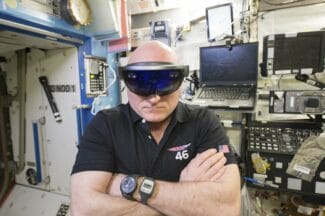A recent blog post from NASA detailed various ways that VR and AR technology is used aboard the International Space Station and back on Earth to prepare astronauts for take-off.
According to NASA, VR/AR tech is becoming an increasing strong staple in life aboard the ISS, often used to help astronauts complete tasks or activities in new or easier ways. There’s nine examples in the full blog post, alongside some photos showing a few VR and AR headsets you’re probably familiar with.
The most common headset pictured in the blog post is the HoloLens, Microsoft’s enterprise-only AR headset. The HoloLens has been used in projects such as Sidekick, which used high-definition holograms to help show crew members 3D schematics and diagrams while they work. It was also used for T2 AR, a project that will help guide astronauts through maintenance tasks for their space station treadmill, avoiding the need for real-time communication with ground crew back on Earth.
It’s not all AR though — VR is also adopted across the ISS. Some astronauts are pictured using Oculus Quests to test whether adding VR environments might improve astronauts’ exercise bike experience, while others are pictured using Oculus Rift and other headsets for a variety of tasks like operating robotic arms or piloting space vehicles.
The post also mentions The ISS Experience, a multi-episode immersive VR series by Felix & Paul Studios and TIME Studios, filmed over multiple months aboard the ISS. NASA says the series gives people on Earth insight into life aboard the ISS, along with potentially sparking ideas and inspiration for further research and improved conditions for astronauts. The series won an Emmy Award for Outstanding Interactive Program recently, and the first two out of four planned episodes are available now through the Space Explorers app for Oculus Quest and Rift.
You can read NASA’s full blog post, detailing all the ways they use VR and AR technology aboard the ISS, here.





